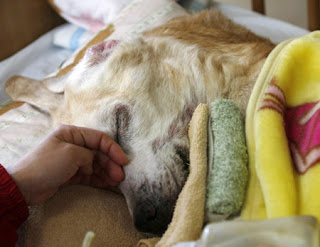Dogs that went through an accident or have a certain illness could become immobile. They could lose the ability to move and control their legs, have difficulty walking or end up lying around all day. This is a sad situation but there are still a few things that dog owners can do to help their pets be able to move again.
Therapy
Dog owners can now sign their dogs up for physical therapy sessions at their local animal clinic or hospital. There are some physical therapists that specialize in animals but some vets are also knowledgeable about the practices and therapies to help dogs be able to walk again. Dogs who undergo therapy, especially the ones that are ill with degenerative myelopathy, tend to develop the illness slower and regain control of their paws.
Ramps
Little things like ramps and elevations can help your dog get around the house or into your car a bit easier. You don’t have to purchase those expensive ramps, you can just create one out of some wood or even just get the inexpensive ones. These help your do move up the stairs, get into cars and even go from one floor to another in your house.
Booties and mats
If your dog has a hard time standing up because it can’t control its lower limbs anymore, let them wear a bootie so that they can have a better grip on the floor. Another way to help them out is to place mats on areas in the house where they might need to turn. This helps to avoid them from slipping and tripping. This helps dogs with arthritis and degenerative myelopathywhen keeping their balance and not falling off.
Wheelchairs
If your dog has completely lost its ability to move its hind legs, then getting it a wheelchair will help. Ask your vet id they can offer a good doctor that can fit your dog a wheelchair. Don’t just get any readymade one since this could not be the right fit and size for your dog.
Medication
Although some immobility problems are not curable, you can still help minimize symptoms by giving your dog some medication. Other vets would just advise some additional food supplement and extra exercise. Before giving your dog any form of medication or food supplement, make sure that the vet approves it first. Regular check-ups are also advisable.
You have read this article Degenerative myelopathy /
dm dogs /
dm in dogs /
dog health /
pet health
with the title dm in dogs. You can bookmark this page URL http://memoirsofsicelikmanesh.blogspot.com/2012/11/caring-for-immobile-dogs.html. Thanks!























